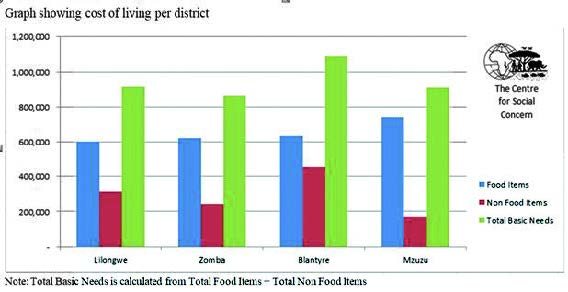Key Business Points
- Rising cost of living in Malawi is affecting low-income households, with the Basic Needs Basket increasing from K938,291 to K945,029 in October 2025, due to sharp increases in vegetable prices, such as tomatoes and onions, which are central to daily meal preparation.
- Food inflation is being driven by factors beyond maize prices, including increases in protein sources, cooking oil, sugar, and essential hygiene products, making it essential for businesses to consider the impact on their operations and supply chains.
- Social protection interventions are crucial to cushioning households from the effects of inflation, including expanding cash transfers, introducing urban food vouchers, and scaling up the School Feeding Programme, which can help support local businesses and stimulate economic growth.
The cost of living for low-income families in Malawi continues to rise, with the Basic Needs Basket (BNB) showing an increase from K938,291 in September to K945,029 in October 2025. This upward shift reflects growing pressure on households that are already struggling to afford essential goods and services. The decline in maize price, which is traditionally the main driver of food inflation, was not enough to ease the burden on households due to sharp increases in other essential food items and household commodities.
One of the major contributors to the rise in the cost of living was the significant increase in vegetable prices. Tomatoes and onions, which are central to daily meal preparation, became more expensive across cities such as Lilongwe, Zomba, and Mzuzu. For instance, tomato prices in Mzuzu increased from K3,022 to K3,832 per kg, while onion prices jumped from K3,479 to K4,492 per kg. These increases have immediate effects on meal costs, especially for households that rely heavily on vegetables as part of their daily diet. As Malawian entrepreneurs, it is essential to consider the impact of these price increases on their businesses and explore opportunities to support low-income households.
Protein sources also recorded sharp price increases, further worsening nutritional challenges for low-income families. Prices of dry fish varieties such as usipa and mcheni rose substantially, while beef prices in Mzuzu increased from K12,000 to K14,000 per kg. Protein foods are already expensive for many households, and these additional increases reduced affordability even further, pushing more families toward less nutritious, carbohydrate-heavy diets. Ndalama za mtengo, or the cost of living, is becoming a significant challenge for many Malawian families.
Cooking oil prices saw some of the sharpest increases, particularly in Mzuzu where the price of a 2-litre bottle was fetching K14,883. Cooking oil is a daily essential with no practical substitute, meaning households must either spend more or reduce the number of cooked meals. Sugar prices also rose dramatically in Lilongwe, Zomba, and Blantyre, contributing to the overall inflationary trend. Beyond food, essential hygiene products such as Protex soap, Vaseline -Blue Seal, and Clere Lotion became more expensive, adding to the financial strain faced by families.
The cumulative effect of these increases has been particularly harsh on low-income earners. Families are now forced to reduce the quantity and nutritional quality of their meals, often prioritizing food expenditure over critical needs such as healthcare, education, and sanitation. With wages remaining stagnant and purchasing power eroding, urban households—who depend almost entirely on market purchases—are feeling the heaviest burden. The situation highlights deepening economic vulnerabilities at household level, especially in cities where there are limited opportunities for ulimi wa kufunika, or subsistence farming.
To address these challenges, social protection interventions are crucial. Expanding social protection interventions remains one of the most effective and immediate strategies for cushioning Malawian households from rising food prices and the general increase in the cost of living. This can include increasing the value of cash transfers to match inflation, introducing emergency inflation adjustment mechanisms, and scaling up the School Feeding Programme. Additionally, introducing urban food vouchers and providing small business grants, entrepreneurship training, and support for backyard gardening and small livestock rearing can help support low-income households and stimulate economic growth. By supporting these initiatives, Malawian businesses can help mitigate the effects of inflation and contribute to the country’s economic stability and growth.
What are your thoughts on this business development? Share your insights and remember to follow us on Facebook and Twitter for the latest Malawi business news and opportunities. Visit us daily for comprehensive coverage of Malawi’s business landscape.

